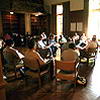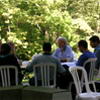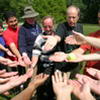Important Dates
- June 2 (extended)
- Paper submissions due.
- June 9
- Shepherding begins
- July 28
- Deadline focus group / workshop proposals
- Aug 4
- Second draft due for review
- Aug 7
- Notification of acceptance
- Oct 1
- Conference registration ends
- Oct 1
- Conference versions due
- Oct 23
- Patterns Bootcamp
- October 23-26
- PLoP Conference Days
- January 15, 2014
- Proceeding version due
SUBMISSIONS
- Call for participation: submission categories, submission process
- PDF of Call for Participaiton
- Submit a Paper or Update your Submission
- Shepherding process: list of papers, authors, and shepherds
- Proceedings: conference version, final version, digital archives
- Important dates
Call For Submissions
April 1994: Members of the small, eclectic, and informal Hillside group gathered in Ben Lomond, California, for their yearly retreat and in the redwoods that Spring hatched a plan that was PLoP 1994. In response to the criticism that by putting together such an unconventional conference they would show they didn't know what they were doing, one of them suggested, "then let's pretend to know."
To celebrate its 20th anniversary, PLoP in 2013 will return to its first home, Allerton Park, and the conference program will include a variety of special events alongside the usual PLoP fare.
This is your invitation to participate - to share your knowledge, to help others improve their understanding and their pattern languages, and to be helped in turn. PLoP's focus encompasses every aspect of software: design, programming, testing, architecture, user interface design, domain modeling, education, human relations, and software development processes. Patterns and pattern languages for domains outside software have always been welcome, and this year, PLoP 2013 especially invites contributions that reflect on the history, current practice, and future of patterns.
Newcomer or oldtimer, all are welcome, and this year we expect to see familiar faces from the past: founders, early participants, and people who form the stuff of legend. Help us start up the future: From redwoods to prairie to...?
Important Dates
- Initial Draft Submission deadline May 19, 2013
- Start of shepherding June 2, 2013
- Focus Groups Submission July 28, 2013
- Second draft due for review July 28, 2013
- Notification of acceptance August 7, 2013
- Early registration ends September 15, 2013
- Conference versions due September 26, 2013
- PLoP bootcamp October 23, 2013
- PLoP conference days October 23-26, 2013
- Proceedings versions due January, 2014
Submissions
PLoP accepts papers containing patterns or pattern languages as well as experience reports and papers related to the theory and use of patterns. You also can submit proposals for free-format discussion groups or workshops that bring together people interested in a (hot) topic related to patterns. Proposals addressing interdisciplinary topics and topics from domains other than software development are encouraged. Non-conventional formats are welcome. Submissions should fall into one of the following categories:
Pattern Papers
Short papers (5-10 pages) containing one or more patterns. Longer papers containing pattern languages or sequence as well as work-in-progress papers will be considered. All accepted papers receive in-depth shepherding by an experienced pattern author before the conference. Long papers might have only a portion shepherded and workshopped. Papers may receive further shepherding at the conference.
Papers on Applying Patterns
Papers on the practical application of patterns. The focus of these papers should be either on applying patterns to industrial projects, education, and organizations, or on systematizing the application of patterns. They should stimulate discussion on how better to disseminate patterns in higher education, training, and practice.
Essay or Classical Style Papers
Essays and classical papers. Some pattern papers don't fit the traditional pattern. Papers in this category can be essay, classical technical papers, or articles.
Focus Group Proposals
Focus groups: free-format discussion groups or workshops lasting approximately three hours. Focus groups bring together people interested in a challenging (hot) topic related to patterns. Non-conventional ideas such as goldfish bowls and renga circles are welcome.
Workshop Proposals
Half-day workshops. In addition to the Focus Groups, PLoP 2013 invites ideas for half-day workshops on a (hot) topic with a pattern focus.
Submission Procedure
The core of PLoP is the Writers' Workshop, where authors work together to improve their papers. Before papers are accepted for a Writers' Workshop, they are shepherded. Shepherding is an iterative process, where an experienced author discusses the submission with its authors to refine the paper prior to the conference. All submissions are peer-reviewed after shepherding.
Following shepherding, papers may be accepted directly into a Writers' Workshop or alternatively, into a Writing Group. Writing Group papers will receive additional face-to-face shepherding at the conference. Writing Group papers reaching a required standard will be considered for workshop review on the final day of the conference.
The PLoP proceedings are published after the conference through the ACM Digital Library. Papers discussed at a Writers' Workshop at PLoP qualify for submission to the journal Transactions on Pattern Languages of Programming published by Springer. You will find more information on: (http://hillside.net/patterns/tplop).
There is a three stage submission process for the conference:
- Initial submissions are assessed for suitability. Papers judged suitable are assigned a shepherd who will help its authors improve the paper.
- Authors are expected to submit a second draft part way through the shepherding process. After shepherding, each paper will be assessed for quality and its authors' willingness to accept feedback. This review will determine whether a paper is accepted to the conference.
- Authors and shepherds are expected to continue until the final drafts are due.
To submit your paper, please visit: http://www.hillside.net/plop/2013/submissionThe final version of the paper should be submitted in the PDF format (produced on a high-resolution output device) on letter paper size (8 1/2" x 11") following the ACM single column format. Initial submissions that don't follow the format will be accepted, but the last version should follow the templates to be published on the ACM library. ACM single column templates are available in Word and LaTex:
- Single column format Word template: Single Column Template
- Single column format TeX template: TeX Template
At least one of the authors of accepted papers are expected to register for the conference before the close of early-bird registration. Failure to do so may result in acceptance being withdrawn.
For more information, please visit: http://hillside.net/plop/2013/
I am looking forward to reading your submissions, learning about the patterns that you have observed, and to meeting you in Allerton Park, Monticello, Illinois. Welcome to PLoP 2013!
On behalf of PLoP 2013 and the Hillside Group,
Christian Köppe
Conference Chair
Shepherding Process
The shepherding process is essentially a reviewing process. Shepherds are individuals, with experience in pattern writing, assigned to an author's paper with the expressed interest in helping the author improve the pattern. Most Shepherds also have experience with the shepherding procedure, either having been a shepherd before or a sheep(an author).
Shepherding is about improving the pattern itself, while the Shepherd maintains that the author is the one doing the pattern writing. The shepherding process is done before the paper is to be presented at a conference. The Shepherd guides the sheep into a more mature understanding of his or her pattern.
Near the end of the shepherding, Shepherds must submit their recommendations to the Program Committee members, which then decide about its acceptance to the part of a writer's workshop of the conference. After accepted, authors and shepherds can continue evolving the papers to produce the conference draft version.
For a more in-depth description of this reviewing process typical of PLoP's, visit "The Language of Shepherding" (PDF) written by Neil Harrison.
All the papers submitted and accepted to be shepherded for PLoP are available for Program Committee members, shepherds, and authors.
PROCEEDINGS
The conference version of the papers will be publicly available, individually, by writers' workshop, and into the preliminary conference proceedings.
Being feedback and improvement the focus of the writers' workshops, papers are not considered final once they have been workshopped. Authors incorporate the feedback they receive at the writers' workshop into their papers before the papers go into the final proceedings to be produced after the conference, which will be made available through here.
Post-conference papers will be digitally archived by ACM.
TPLoP Journal
Papers discussed at writer's workshop at this conference qualify for submission to the new journal "TPLoP - Transactions on Pattern Languages of Programming" published by Springer. See Springer's pages on TPLoP for details of this journal.





